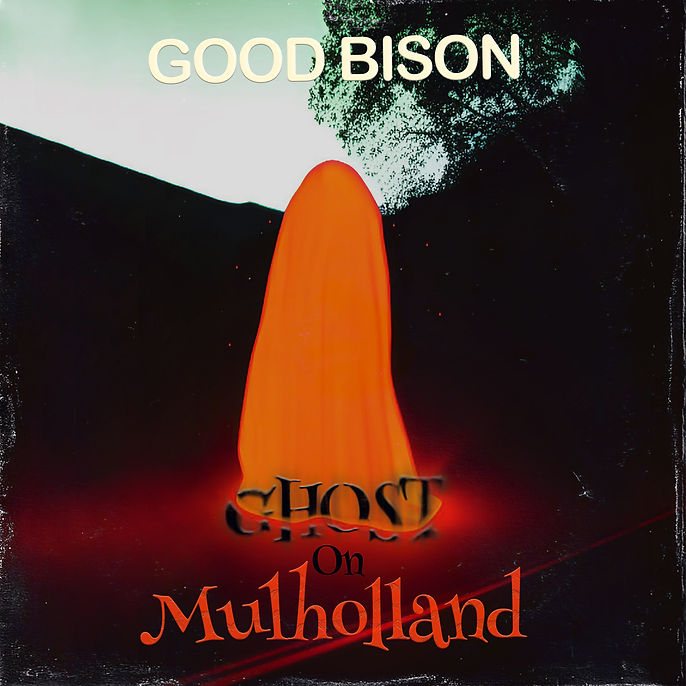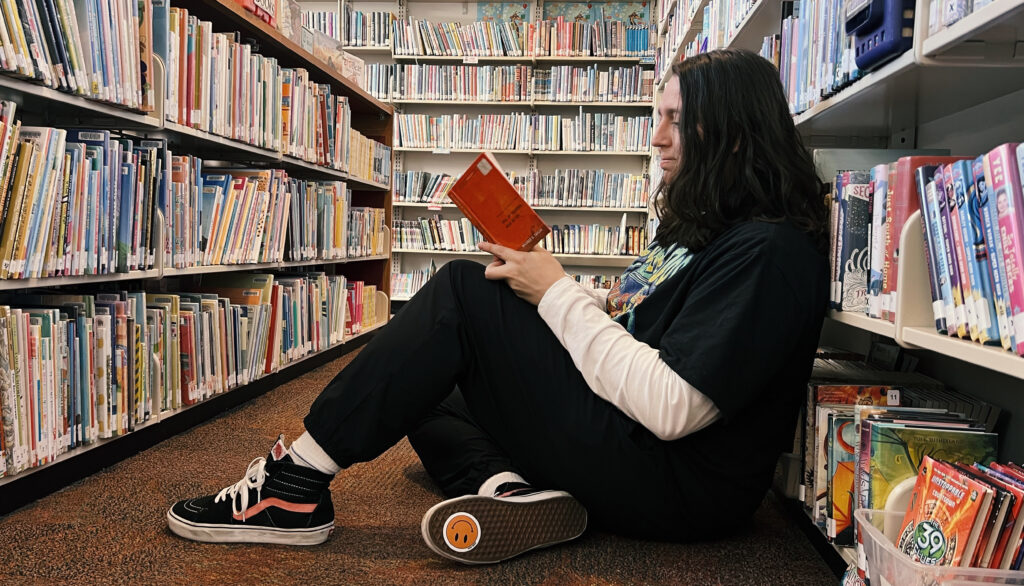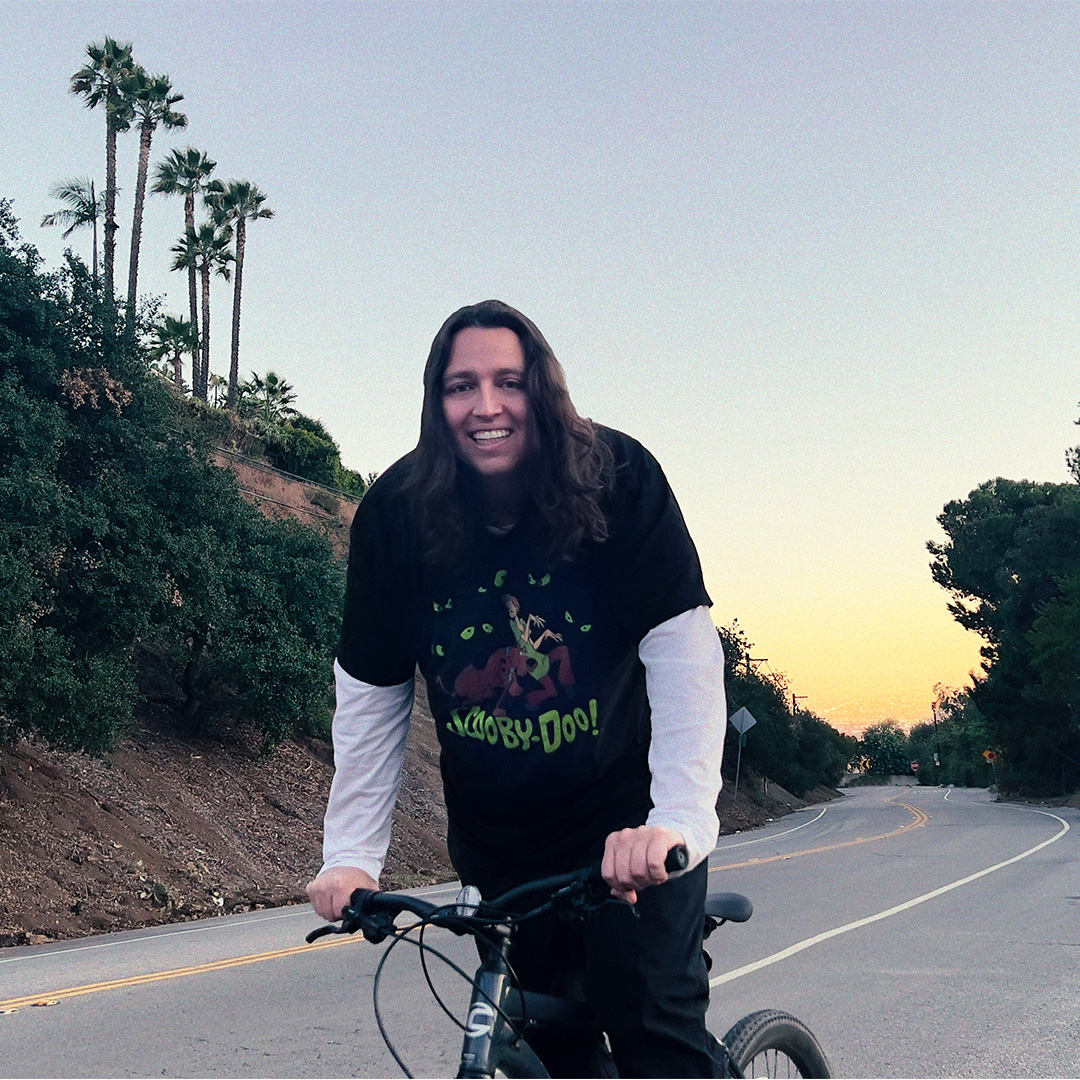In 2017, after a botched attempt the year prior, Pablo Alvarez won the Guinness World Record for the longest freestyle rap, which clocked in at 25 hours and 56 minutes (minus the piss breaks). He held the title before being dethroned by Watsky in 2020.
In the same year that he won the record, the previously Miami-based Alvarez released his first album with his new L.A. project Good Bison, called That’s Bodhi. The effortlessly flowing, free-associating hip-hop on Bodhi is what you may have expected from such a record holder but the band’s succeeding discography may not. After a half-decade of metamorphosing, last Tuesday (at the time of this article’s publication) Good Bison released their latest EP, Ghost on Mulholland, which initially seems like a collection of nonchalant, good vibes, soft indie pop tunes but is actually a sinisterly plotted and crafted concept record, which both lyrically and musically feels like a completely different artist to their first album.
A week prior to the EP’s release, Alvarez joined Post-Burnout to discuss Ghost, his versatility, his growth as a musician and lyricist, writing in Spanish compared to English, and how moving to Los Angeles from Miami changed his music.
__________________________________________________________________________________
Talking about your new EP, Ghost on Mulholland, I think a lot of your music up until now has been very experimental and there’s been a lot of influences obviously from hip-hop and everything from indie rock and somewhat lo-fi, but I think this is the first EP to have continuity with the previous one, which was Scattered Storms. Do you think that’s fair to say?
Yeah, I would say that Ghost on Mulholland is definitely the continuation of the sound that I started exploring on Scattered Storms. Scattered Storms is more stripped and acoustic but, in this new project, we kind of kept leaning into that organic sound and relied only on live instrumentation.
Yeah. […] [Y]ou’ve changed in terms of your music, which is the obvious one, but what I’m interested in is also how you’ve changed as a lyricist. I was wondering if maybe you could talk about that? Because if you listen to your first album [That’s Bodhi], for example, it seemed like, back then, you were making a lot more pop culture references and stuff. Where it seems like now you’ve kind of gone in a bit more of a different direction. Yeah, so I was wondering how you think you’ve evolved, as a lyricist?
Yeah, that’s interesting because it’s not something I put as much focus on, consciously, but it has been something that I have…that has evolved along with the type of musical expression that I’ve wanted to get into. I would say when I first started making music, I was very conscious about what I was writing in the moment, in the sense of, “Well, I’m writing a rap right now and now I’m writing a chorus and now I’m writing a more melodic part.” So, I would really differentiate between what I thought were rap-style lyrics and what I thought were not rap lyrics and, as I got more comfortable just experimenting with sounds and finding a balance that works with me, I just stopped thinking so much about the divisions between my writing styles and gravitated more towards, “Well, it’s all part of the same expression, so whatever comes out, comes out.” As far as pop culture references and things like that, I think that’s part of when I used to write with a more hip-hop mentality. Hip-hop, you’ll hear a lot of references to current events and pop culture and things like that. A lot of metaphors, that’s really important in hip-hop, it’s utilised a lot in rap lyrics and so, as I’ve gravitated away from that in the sense of just thinking about my lyrics from a broader perspective, and also I really prioritise making something timeless and I think pop culture references, or really any kind of references, date your music and kind of attach it to a very specific time period.

Yeah. I think I heard you reference Eminem as being an original influence when you were a kid, and like, I think when you listen to his records, I find – and I don’t know if you agree with this – but I find it feels like a time capsule, in a way…
Yeah.
Where you’re like, “Oh, you know, that was kind of relevant then. I remember that from back then!” [Laughs]
Yeah.
Yeah, so that’s something you don’t want to do? You want everything to be, I guess, timeless, would that be fair? You don’t want things to be a time capsule?
Yeah. It’s weird because I do want timeless[ness] but I do also think that songs are a time capsule by nature, so even if they’re not dated in the sense of the references in the lyrics, they’re dated just by where I was when I was working on it. So it’s dated in a very…They’re time capsules from moments in my life but…So, in that sense, it’s not that I am against references or I would never utilise them again, they just have to feel very true to the moment for myself.
I think one adjective that I keep seeing your music being referred to as is “sun-soaked” and I do think this new album has…on a surface level, has a very laidback, sort of relaxed attitude but the veneer of something more sinister or, I don’t know, something more underlying that seems a little uncomfortable that you want to explore, is that fair?
Yeah, I would say that’s definitely fair. I think that’s why it made so much sense to tie the EP to the narrative of a ghost story and escaping this haunting because even in those more positive, more sun-soaked moments, there’s something ominous creeping right outside of view and this record was all about letting those things that are outside of view kind of come into frame and take more prominence.
And having a premise like that, to write the album around, did that make it more freeing or was it more restrictive, when it came to writing individual songs?
So, the narrative actually came towards the end of the writing process for the EP, because the first thing we worked on was the music, writing the songs, and as we were working on the music, the narrative started to take shape, so in no way was it restrictive because the songs informed the arc of the story and the entire narrative was already baked into the music. It was more so about fleshing it out and giving it shape, in the form of the ghost.

Yeah, and I was interested in the sort of background of your music. So, my understanding is that you were born in Columbia and then moved to Florida, and that’s kind of how you got into music, through the skate scene there, and now you live in California. This is a weird question perhaps, but maybe if you’d indulge me, but, you know, we’re talking about the idea of your music being sun-soaked, and I think those three places are known for being quite hot, but, from your perspective, how do you think the sun in each of those places differ?
Um…that’s interesting. So, the sun’s much more scathing in Los Angeles. It’s the desert, so the sun is intense, and you feel like you’re in an oven sometimes. Whereas, in Miami, the sun is not as intense because it’s almost deflected by all the humidity in the air; it’s so humid and it’s more so that you’re in a sauna when you’re in Miami, rather than an oven. And I actually…in Columbia, I was born in Bogotá, so it’s much…it’s kind of a hybrid between Los Angeles and Miami because it’s up in the mountains, so you get a lot of sunlight but it’s also very, very humid and much more tropical, so it’s not as intense; it’s a more just constant warmth.
Do you think…because, obviously, I think the climate and the weather we’re exposed to do kind of influence our musical output. You know, I think it’s generally accepted that, you know, people from kind of colder climates make more melancholic music and stuff. [Laughs]
Yeah. [Laughs]
Yeah, but I mean, do you think the locations you’ve been in has influenced your music in that way?
I definitely think…So, yeah, for sure. Even though, when I was in Miami, I kind of felt out of place with the type of music I was making. I think that’s why I relate so much to California and why it made so much sense, once I found myself out here in Los Angeles. I definitely think it’s a subconscious thing that influences my music; it’s not like, “Oh, I’m from these places and I grew up surrounded by these things, so I’m going to write music that reflects that,” but it’s almost impossible to get away from. You know, I grew up going to the beach. I grew up spending time outside and, you know, riding bikes and rollerblading and just doing things in nature also. So, I think there’s a part of me that wants my music to be the soundtrack for those kinds of moments.
And kind of going back to your evolution as a musician. At one point, you held the Guinness Record for rapping. What was it, the most continuous rapping or something?
Yeah. [Editor’s Note: Pablo’s Guinness World Record was for the Longest Marathon Freestyle]
[…] It seems like you’re proving yourself as not only a rapper but you’re…expanding beyond your origins, let’s say, but you’re not afraid to bring them into the mix too and I think there’s some really great rap breakdowns in your songs on this album but I think, simultaneously, it doesn’t seem to be the primary focus. I was wondering how you kind of came to that kind of balance of, “OK, I’m not going to shun it but I’m going to try something else too”?
That was actually a big challenge for me because I…like I said, I used to, at a certain point, approach my music through that kind of clinical edge, where it’s like, “Right now I’m rapping” or “Right now I’m doing this.” So, once I was able to break down those barriers, I was kind of able to open myself up to expressing myself artistically with all of the different elements of music that appealed to me. I think I had to get much more confident in myself as a musician and an artist because I was never a trained vocalist or trained on an instrument, I don’t know music theory. I was only ever a good writer, that’s what I felt like I had to attribute, in the sense of working on music, it was my lyrics and when I started working on music, it was primarily hip-hop, I was rapping, and the reason why is because, you know, you didn’t need to have a good voice, you didn’t need to know anything about music; if you could write lyrics and you could stay on beat and have a good flow, then that’s all that mattered. And it took a long time for me. It took, you know, being in bands in Miami and continuing that in the shape of Good Bison here in Los Angeles, being around other musicians, to really realise that I wanted to express myself in different ways and I had the tools at my disposal to kind of make that happen. So, I just really had to decide what kind of artist I wanted to be, and when I thought about it, it wasn’t, “Oh, I want to be a rapper;” it was just, “I want to be able to experiment with sound and genres and make whatever is…”
Appealing?
“…true to me.”
For the Good Bison project, you’ve talked about it as being somewhat of a fluid project. I know your previous band – I’m forgetting the name. Dinosaurs ‘N Destructions, is that what it was called or…?
Dinosaurs ’N Disasters, yeah. [Laughs]
Dinosaurs ‘N Disasters, I apologise. I didn’t have it written down. But, you know, there were members of that band who were in Good Bison but it does seem like, I don’t know, a different kind of project. I was wondering if you could maybe just talk about how it sort of differs from a typical band, I guess?
Yeah, I think the difference is that it has…Good Bison is always going to be a collaborative project because that’s a very important part of music for me and, as you said, I started it with Mauri [Viladegutt] and Sebas[tian Delgado], who were in Dinosaurs ‘N Disasters with me, they started Dinosaurs ‘N Disasters with me as well, so it was always a band and a collaborative project. But the members are in a constant state of flux. So, this record still has Sebas, for example, on it, who started Good Bison with me, and he’s on the drums and backing vocals. But there’s a bunch of other musicians who helped make this possible and particularly working on it with Abe Mendez, who was the lead producer and really just saw this through from beginning to end. I think that’s what sets it apart, in the sense that there’s just not a constant line-up; it’s whoever’s up for the next project and wants to be a part of it, and it’s typically been who I’ve worked with and been surrounded with since the Dinosaurs ‘N Disasters days.
I guess one final thing I’ll ask is that the new album has a song called “Haunting,” which has a kind of Latin influence in its music but it has you singing in Spanish, as well. I was wondering, as someone who speaks fluent English and Spanish, how does writing in one language compare to the other? Does one happen to be more personal than the other or anything like that?
Spanish is my first language; I grew up speaking Spanish. I only speak Spanish with my mom and my family, like, we don’t speak any English in my household like that. But expressing myself creatively, emotionally, artistically is so much easier for me to do in English. I have more words and, I don’t know, sentence constructions at my disposal. So, writing in Spanish was a challenge because I’m very critical of my lyrics and I don’t ever want to use anything that’s filler, and when I was writing in Spanish, it felt like I would fall back on filler so often and I would have to revisit the verse and be like, “No, this…I’m not saying anything here. I’m just trying to fill in the gap,” and so it took a lot more work, I would say, to write that verse than to write other verses and I worked on it as well with Abe and Sebas, who are both fluent in Spanish, and we worked on it together.

Perfect. That’s everything I had to ask. Is there anything you’d like to add before we wrap up?
No, this was great. Honestly, I really appreciate you taking the time to talk with me. I had a good time and, yeah, the EP will be out next Tuesday [on the day of the interview] and we’ll probably be announcing some live shows in the second half of the year, in Miami and other cities on the East Coast of the U.S.
Sweet. Thank you very much for your time, man.
Yeah. Thank you.
Good Bison’s latest EP, Ghost on Mulholland, is out now and available to stream and purchase here. You can follow Good Bison on Facebook, Instagram, Twitter and YouTube.

Aaron Kavanagh is the Founder and Editor-in-Chief of Post-Burnout. His writing can also be found in the Irish Daily Star, Buzz.ie, Totally Dublin, The GOO, Headstuff, New Noise Magazine, XS Noize, DSCVRD and more.

 POST-BURNOUT
POST-BURNOUT